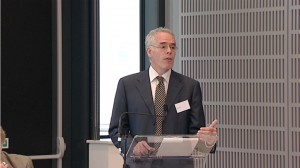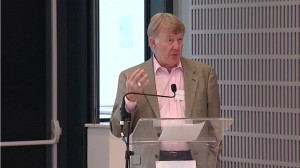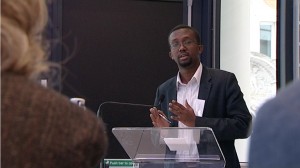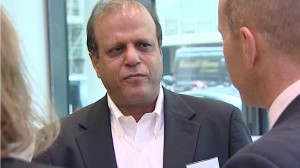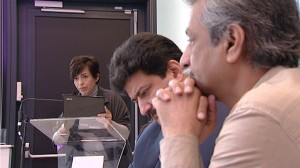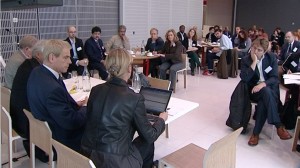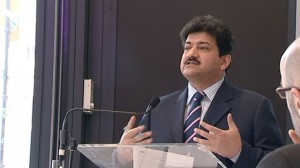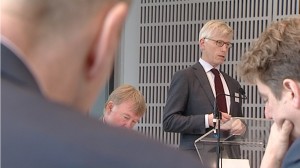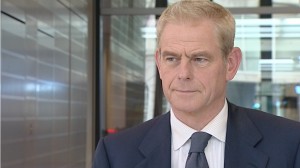To the UN Inter-Agency meeting on the Safety of Journalists and the Issue of Impunity in Vienna on 22-23 November 2012
This is a transcript of the video from the symposium “Media responses to matters of life and death” held in BBC new broadcasting house on 18 october 2012. The symposium was co-hosted by the BBC College of Journalism and the Centre for Freedom of the Media, University of Sheffield
Symposium on Media Responses to the Killing of Journalists and Impunity – October 18th 2012 in BBC New Broadcasting House
PETER HORROCKS, DIRECTOR, BBC GLOBAL NEWS: The BBC’s journalists. along with other journalists around the world face enormously increasing threats , threats to their physical safety, legal threats, impediments. And when journalists are killed often those issues are not examined and looked into properly by governments. Todays’ meeting is about raising that subject up the international agenda, by creating pressure on governments and inter-governmental organisations to put in place the proper international frameworks to ensure that journalists are protected as fully as possible.
Censorship by violence
RODNEY PINDER, INTERNATIONAL NEWS SAFETY INSTITUTE: As long as people can murder journalists and get away with it, it’s the cheapest, easiest and risk-free form of censorship and its being used increasingly.
OMAR FARUK OSMAN, SOMALI NATIONAL UNION OF JOURNALISTS: Not only journalists are being killed in Somalia by bullets, they are also killed by beheading. And those who are perpetrating these kind of crimes are saying ‘Look, we want to show you the merciless way we can deal with you as journalists.
ZAFFAR ABBAS, EDITOR OF “DAWN” NEWSPAPER, PAKISTAN: The local stringers, other correspondents and fixers are needed; and they are most vulnerable people on the ground.
ANABEL HERNANDEZ, MEXICAN JOURNALIST AND AUTHOR OF “THE DRUG LORDS” : Since I published the book in 2010 I received death threats, and now I live with bodyguards 24 hour of the day.
State of Impunity
GALINA SIDOROVA, RUSSIAN JOURNALIST AND CHAIR OF THE EXECUTIVE BOARD OF THE INTERNATIONAL PRESS INSTITUTE: We are talking now about 43 people being killed since the year 2000, and we are talking about 160 attacks and menaces on journalists in the year 2011 and we talking about ten attacks already in September, last September. Unfortunately most of these cases are not being solved, even those cases that are very widely known, so the perpetrators were not brought to justice.
HAMID MIR, PRESENTER, GEO TV, PAKISTAN: This little girl was openly saying that I want to go to school, and the Taliban militants were standing behind her with weapons in their hands… The Talban have announced open war against Pakistani the media, because we are supporting the little girl, Malala Yousafzai, who first came on my show. And we are facing threats not only from the Taliban: the Pakistani security forces and intelligence services are also involved. So we are in a crossfire, and the government of Pakistan is doing nothing to protect the media in Pakistan.
Turning the Tide
BOB TYRER, EXECUTIVE EDITOR, THE SUNDAY TIMES: Well there’s the basic nuts and bolts of ensuring their safety when they’re in the field, which means sharing information, talking to the right people, being prepared to pull them out when they are in grave danger — which of course we discovered in Syria with Marie Colvin. But on a much greater scale I think we also need to press UNESCO, the UN, symposiums such as this one, for real headline efforts that people will notice. I’m suggesting that killing journalists should be a crime against humanity. That may sound rather grand, rather sweeping. But it is at present a war crime to kill journalists deliberately in war — nothings come of that. It’s illegal to kill journalists specifically in many countries — nothing has come of that. So let’s see if something can come from at least a discussion about its being a crime against humanity.
The 2012 UN Action Plan on the Safety of Journalists: What the Media must do
CHARLIE ENGLISH, FOREIGN EDITOR, THE GUARDIAN: The fact that we have a global audience now means that when we report these stories in potentially far-off countries the people actually read about them on the Guardian site, and they cause a stir locally as well as in the international press. So we do try and do it, but I think we could do more of it.
The “London Statement” of 18 October 2012 : Raising the political cost of violence against journalists
WILLIAM HORSLEY, CENTRE FOR FREEDOM OF THE MEDIA, UNIVERSITY OF SHEFFIELD: A large number of editors and journalists here support the statement that we are sending to the UN and the international community – an 8-point statement focusing on the need for media and others to scrutinise governments and particularly to end impunity, that means the ability of state officials, by neglect or complicity, to allow crimes against journalists to go unpunished. We must raise the political cost to governments of allowing violence and impunity against members of the press.

